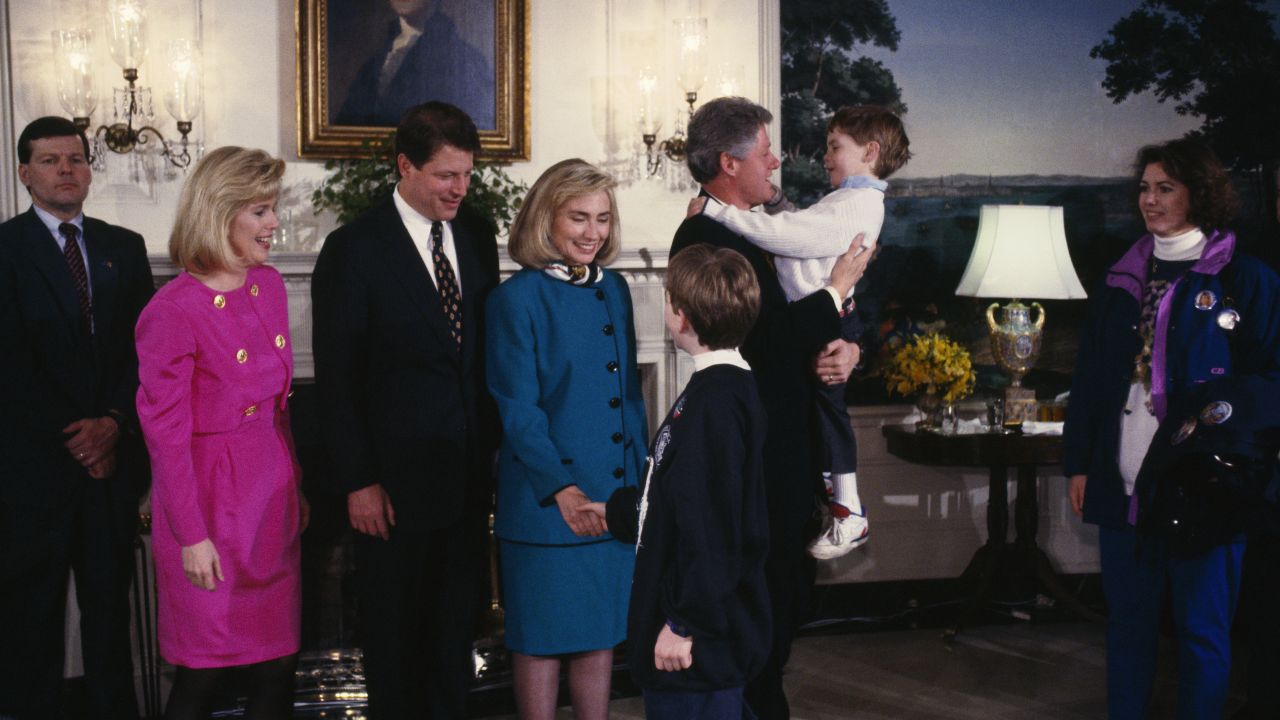
Hillary Clinton might do well to show the same emphatically expressed concern for average Americans that she did on her husband's first inauguration day. (Photo by Jeffrey Markowitz/Sygma via Getty Images)
More than 25 years ago, on her husband’s first inauguration day, Hillary Clinton did something that was both eyebrow-raising and — to pick two words not often associated with this year’s Democratic presidential nominee — genuine and endearing.
The Clintons were celebrating their move into 1600 Pennsylvania Avenue in Arkansas populist style — with an open house. It was far more successful than anticipated and, hours into a long White House receiving line, aides decided it was time to hustle Bill Clinton to his next engagement.
That’s when his wife staged an intervention. Before he left, she brought him outdoors, where he could at least give the 1,500 guests still waiting in the cold a glimpse of the new president whose hand they had been waiting to shake. TV boom mics caught the first lady urgently making her case in terms no one in her position had been heard to utter before.
“We just screwed all these people,” she whispered to her husband.
It’s exactly the kind of plain-spoken candor and empathy Hillary Clinton might want to consider deploying right now. It might work better than somewhat irritably wondering why a groundswell of labor support hasn’t put her 50 points ahead of her Republican rival, Donald Trump. Or than her supporter-in-chief, President Barack Obama, warning that “I will consider it a personal insult, an insult to my legacy” if African-American voters don’t turn out.
Not that the exasperation of Clinton and her allies isn’t understandable. Despite a widespread consensus (including, reportedly, one former Republican president of the United States) that Trump has neither the professional nor temperamental chops for the White House, the race remains close. So close that, according to a report in 538.com by the Cook Political Report’s number-crunching wizard, David Wasserman, thanks to our constitutional appendix of an Electoral College, a shift in a few key states could put Trump in White House even if he loses the popular vote.
According to Wasserman’s “dempocalypse” analysis, the kingmakers in this scenario could be white working-class voters. The same working class whose plight and pariah status has been the subject of book upon book this year. The working class that Trump is overtly courting and that Clinton allowed herself to be portrayed as deplorably broad-brushing, at a Manhattan fundraiser no less. But there are other big Electoral College prizes where the race is essentially tied, and where Clinton will need minority and young voters: troubled North Carolina, Florida and Nevada.
Is it really fair, or even reasonable, to expect these people to go to the trouble of showing up at the polls to vote for you just because your initials are not DJT? Clinton is spending so much time telling people what’s wrong with Trump that she’s failing to give them any sense that she understands what’s wrong with their lives.
She might do better to channel her refreshingly honest 1992 self. Maybe it’s time to acknowledge that the Democratic Party has taken working-class voters for granted, written them off and — well, maybe the “s” word isn’t really appropriate for a nationally televised debate, though Trump certainly has expanded the lexicon of acceptable presidential language — certainly not done them any favors.
Maybe it’s time to admit this is one rising tide that didn’t lift all boats. That Bill Clinton’s bridge to the 21st century didn’t get everyone across. That it created a fast lane for some people, left others stuck in traffic and some worrying that they are about to be pushed off.
Consider:
- As the AFL-CIO’s Thea Lee has pointed out in this space, trade policies initiated by George H.W. Bush but embraced by the first Clinton administration not only displaced blue-collar workers but set off economic trends and legitimate angst that now has gone far beyond the working class.
- The repeal of Glass-Steagall, signed during the first Clinton administration, helped set up the reckless bank behavior that led to many Americans — of many hues and economic circumstances — losing their homes while the Wall Street perpetrators walked free during President Obama’s watch.
- The enactment of welfare reform, also backed by the first President Clinton, created a system which, as we previously have explained here, has disproportionately hurt the poor.
- And, as we have also chronicled here, people who have followed the Democrats’ prescription for finding success in the new economy — getting more education — have more often them not found themselves with a pile of debt and no jobs. These are not just young people but plucky adults trying to do the right thing by reinventing themselves.
- Hillary Clinton’s own off-again, on-again support for the rights of undocumented workers.
Back in the 1984 election, the favorite slogan of that year’s Democratic nominee, Walter Mondale, was (borrowing from Wendy’s) “Where’s the beef?” This year, voters might be forgiven for wondering, “Where’s the hope?”
Where’s the candidate who’s talking about them? Who’s focused on how to solve their problems?
To be sure, these are problems that no candidate wants to talk about because no one has figured out how to solve them yet. It’s far easier to focus on faux issues (email, anyone? Or likeability?) than to what deep-down is really nagging at us.
There’s a lot of free-floating anger in our society — the anger of lone disaffected actors or those who have real or imagined connections with the larger movements of mass destruction, the violence of police against citizens and the violence of citizens against police, or the near gleeful insults of Trump and some of his supporters against people who don’t look or dress or think like them. All of it is a symptom of a society that’s fraying at the edges.
This is a nation that has always prided itself on its ability to rise to a crisis. But today’s most pressing crises are not obvious cataclysms such as the Great Depression or World War II or 9/11. They are not earthquakes, but gradual erosions: a changing climate that requires monumental changes in policy and personal habits to reverse, a globalizing economy that pits workers against each other in an endless downward spiral while wealthy actors who control capital increasingly move on an extra-national stage, eluding regulation by any government, and, peeking around the corner, automation. These are the kinds of problems that produce anxiety, not adrenaline surges.
They are the kinds of problems no one wants to talk about because there are no prefabricated answers. This is not an exercise for bumper-sticker writers or sound biters. Some of these problems may require radical solutions. So radical that conventional political wisdom would argue against even bringing them up. But Americans have been signaling that they are ready for some unconventional political wisdom: with the election of Barack Obama, the nation’s first African-American president, with the surge of support for septuagenarian socialist Bernie Sanders, with the readiness of some to make reality TV star Donald Trump the nation’s 45th president.
Americans keep finding different ways to send the same message: They are sick of the status quo.
Can Hillary Clinton, whose cozy relationship with some of the Wall Street bankers at the center of the 2008 financial meltdown was detailed in Sunday’s New York Times, convince Americans she’s the one to change it? In the same edition that fronted the story about her chumminess with Goldman Sachs, The Times, on its editorial page, made the case that Clinton is. But the Times editorial board is part of the elite that has gotten to know Clinton. She needs to convince people who aren’t in her social circles that she’s prepared to be an American version of Mikhail Gorbachev: Somebody who has done what she needed to do to convince capitalism’s commissars to put her in power and is now prepared to surprise her patrons with a revolution.
One way to signal her intentions is to acknowledge that the worries and fears and frustrations of millions of ordinary Americans are real and legitimate. The Democrats’ failure to do so has left a vacuum that has encouraged the exasperated to hunt for scapegoats and enabled demagogues to capitalize on that exasperation.
So instead of a lot of happy talk tonight about the benefits of a global economy, the opportunities of education, the possibility of a painless transition with an “all of the above” energy plan, the virtue of nimbleness and the boundless opportunities of a nation that, some 200 years after enslaving blacks, managed to elect an African-American president, how about some inconvenient truths?
Americans are a forgiving people. A nation that loves second chances.
What better way to convince people you’re going to get it right this time than by admitting you got it wrong?




